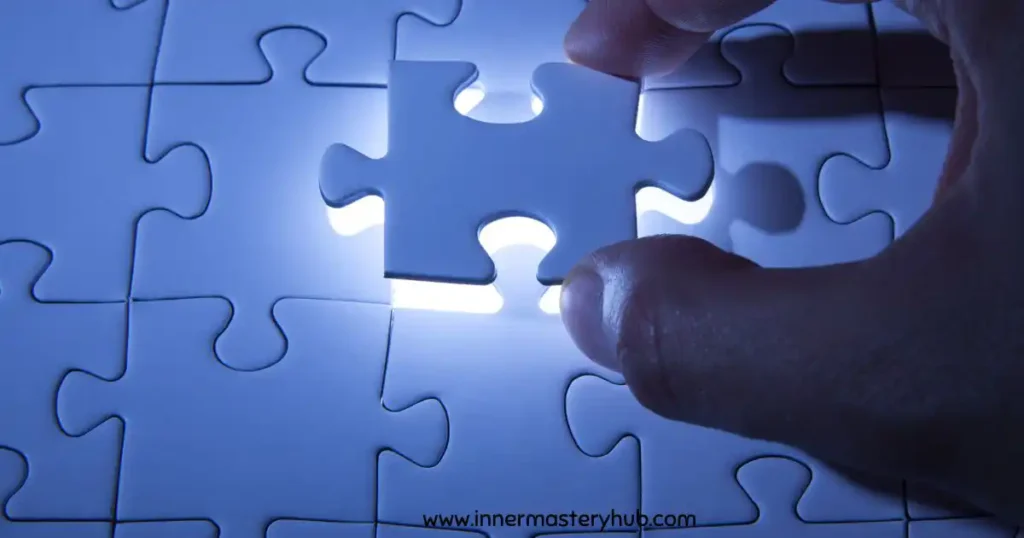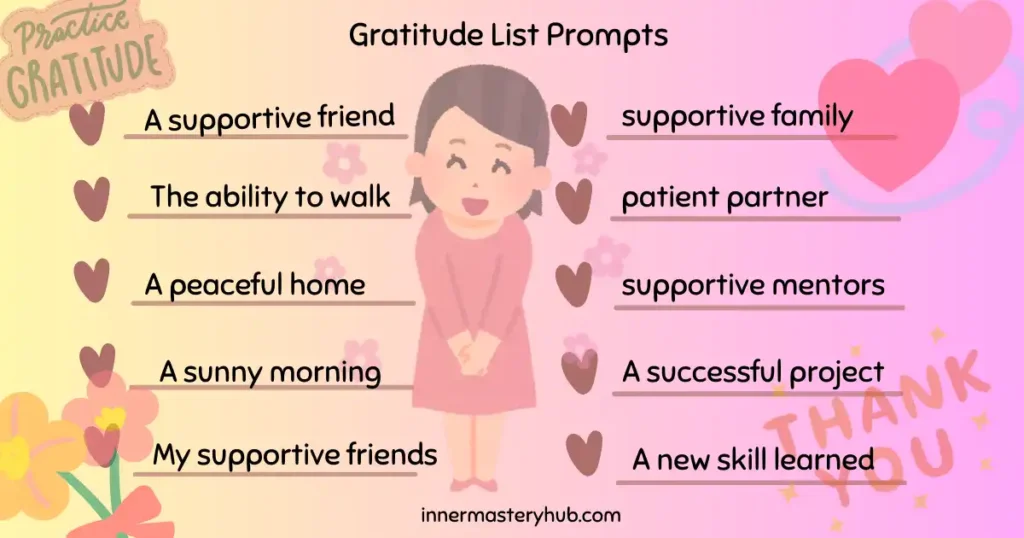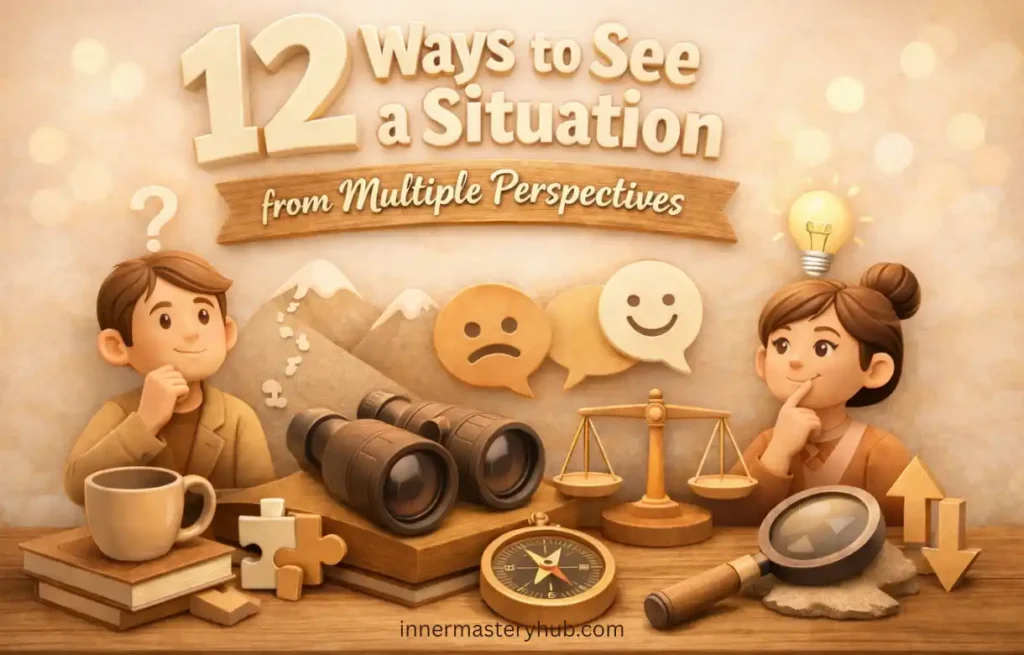Feeling Lost? How to Find Yourself Again in 17 Ways

Your life begins when you start your journey to rediscover yourself, your path, and your authentic self.
Though this path is not easy to tread, I am writing today to clarify that millions of individuals before you have navigated this journey and are now living fulfilling lives, and you can achieve that level too.
Before you try to reach there, I want to make it clear to you that it’s not about destiny; it is the journey that is more beautiful.
For a very long time, I have been working on myself to achieve this level of contentment. There is much I know about the ups and downs of this path to help you kick-start your goal: “How to find yourself?”
Are you prepared to rise above limitations and claim your power?
What Are the Signs You Need to Know How to Find Yourself?
Feeling lost is a common human experience. Here are some common symptoms;
- Overwhelm or anxiety
- Loneliness or isolation
- Confusion and uncertainty
- Lack of purpose or direction
- Lack of motivation or interest
- Feelings of emptiness or dissatisfaction
- Feelings of emptiness or dissatisfaction
- Questioning life choices and values
If you notice most of these signs in your daily routine, it means your inner self is demanding that you begin the journey of finding yourself.
How to find yourself on the journey to self-discovery?
Here are 17 ways to find your true self and reclaim your self-worth and self-confidence.
1. Ask introspective questions.
Asking introspective questions is vital because it helps you understand your true self. These questions help you find what you want and what matters most to you.
They also reveal your identity, your talents, and your flaws, which can help you evolve as a person and make wiser choices.
These self-discovery questions can help you discover who you are.
- Am I being true to myself?
- What am I afraid of? Why?
- What do I want in life?
- What is the purpose of my existence?
- What kind of life do I want to create?
Asking yourself introspective questions helps you understand who you are at your core. By asking these questions, you can find what you desire and what is most important to you.
They also help you identify your strengths, weaknesses, and brand, which can guide your personal growth and help you make wiser decisions.
Give these self-reflective questions some thought to help you find your identity.
Once you have responded to these questions, take a moment to reflect on your learning.
Consider their compatibility with your current lifestyle and prepare to incorporate them.
Using the knowledge you’ve gained about yourself, set clear objectives and begin working towards them.
Speaking with mentors or close friends about your aims and insights might be beneficial. They can offer encouragement and a variety of perspectives.
Monitor your progress regularly and be willing to modify your plans if necessary. Since self-discovery is a continuous process, as you develop, don’t stop asking questions and keep an open mind.
2. Be curious, not critical
Asking questions that promote inquiry rather than condemnation should be the first step in your quest to understand who you are. Ask what you can learn from your mistake instead of why you made it. Consequently, you focus on understanding rather than self-blame.
When you think back on your feelings and thoughts, try not to categorize them as positive or negative. Be mindful of them and embrace them for what they are. You can view things more objectively and plainly as a result.
A self-discovery journey is one in which you discover new aspects of yourself. Rather than viewing new ideas as issues, approach them with interest and enthusiasm.
Take on new challenges and view things from different perspectives. This might keep you receptive to new ideas and improve your self-awareness. Think back on what you’ve learned and how you can apply it to your development. Honor your accomplishments, no matter how minor.
Remember that self-discovery takes time, so have patience with yourself. Being curious will keep you upbeat and inspired as you continue to discover more about yourself.

3. Be curious and not judgmental
I used self-care and curiosity instead of passing judgment because self-discovery is a complicated process. It was also beneficial to ask questions more focused on learning than on passing judgment.
Instead of asking yourself, “Why did I mess this up?” “What can I learn from this experience?” I questioned. I was able to better understand my emotions without getting lost in a blame game because of this.
When I think back on my feelings and thoughts, I try not to categorize them as either positive or negative. I take note of them and accept them for what they are. Taking this technique helps me see things from a variety of angles and keeps my mind open.
I found that trying diverse viewpoints helped me solve my difficulties rather than obsessing over them.
4. Spend time in nature
When things feel chaotic, spending time in nature outside can be helpful. Take a lengthy walk, then.
I find that spending time in nature and getting outside helps me decompress. Nature brings us back to earth, relieving the tension and chaos of daily life.
Thinking more clearly and avoiding distractions are two benefits of being outside. It’s like pressing a reset button, allowing the mind to clear itself of the typical stressors and confusion.
You can better understand your thoughts and emotions when you are at ease and in control. Clarity makes it easier to make more deliberate decisions and maintain focus on your objectives.
5. Learn a new skill
Acquiring new skills can be helpful, particularly when you feel like everything is in turmoil.
Learning something new gives you a constructive focus. This change in concentration allows you to relax and escape whatever tension or confusion you may be experiencing. It is the place where you can push yourself and experience a sense of achievement.
Learning something new gives you direction and a sense of purpose. The learning and development process keeps you composed and concentrated in trying moments.
You get more self-awareness and confidence as you grow and study. This helps identify your strengths and areas of enjoyment.
6. Travel solo
As you travel, you might find that encountering new environments and different cultures gives you fresh insights into yourself. It’s a way to escape your everyday life and gain new experiences that can shape your understanding of who you are.
For me, visiting new places has helped me learn more about my interests and what truly makes me happy.
Traveling solo or spending time alone also pushes you out of your comfort zone and helps you dig deeper, which is a great way to grow. It helps you to adapt, be open-minded, and face challenges in new and productive ways. These experiences often lead to important realizations about who you are.
7. Make new friends
When you meet new people, you gain exposure and develop new ways of thinking. By contrasting and comparing your thoughts and perspectives with those of others, you can better understand yourself.
Having conversations with new people can help you see sides of yourself that you didn’t know existed.
Friends, for instance, might offer you support and constructive criticism that may help you discover new areas of strength and improvement. They may also suggest new hobbies or activities that you had not previously thought of.
8. Avoid toxic people and situations
To identify what drains your energy on your path to finding yourself, begin by observing your feelings following different events or activities.
I noticed that after performing specific duties or attending social gatherings, I felt worn out or anxious. Tracking these emotions helped me spot patterns and identify what was depleting my energy.
Reflect on your everyday activities and identify what drains you, especially if you’re an introvert. You will eventually begin to recognize the things that make you feel depressed or worn out regularly.
As you recognize the people or circumstances that deplete your energy, consider making adjustments where you can.
9. Define your core values
Make a list of the things that are most important to you to start. Reflect on your values and the traits you find admirable in other people. For instance, write down your values for creativity, community, and honesty. Consider how these values influence your choices and behaviors.
In my case, I started by reflecting on the times in my life when I felt the happiest and most content. What values or beliefs underpinned such moments, I asked myself.
Think about earlier instances where you felt strongly about something, whether it was a complex or favorable situation, as you work on identifying your fundamental beliefs.
You may be able to learn more about your values from these events. After determining your fundamental beliefs, you may be able to learn more about your values from these events.
10. meditation
Meditation is a great way to relax during a hectic quest to find yourself. Meditation helps me find some calm and center my thoughts when things feel too much to handle. It’s a straightforward exercise that helps me slow down and concentrate on the here and now.
11. journaling
Organizing your thoughts is simple when you keep a journal. I get my journal and write whenever I’m feeling overwhelmed. I use it to express my feelings and thoughts on paper. This gives me a clearer perspective and helps me sift through the issues.
I’m not concerned with perfection when I journal. I write whatever comes to my mind, be it my everyday experiences, visions, or anxieties. I can clear my head and lessen the stress-inducing clutter by doing this exercise.
12. Define your boundaries
Knowing what you need to maintain your equilibrium and health and making sure you don’t go overboard are the first steps in establishing clear boundaries. The first step is to determine which aspects of your life should be restricted or safeguarded to prevent feeling overburdened.
Evaluate which people or circumstances tend to deplete your energy or cause you discomfort. Once they are clear to you, write down the boundaries you wish to establish, such as how much time you need for yourself or how you would respond to specific situations.
When establishing your boundaries, be honest and open with yourself and others. Saying no to things that don’t fit your needs and goals is acceptable when it comes to finding yourself.
13. support system
It helps to have understanding and encouraging people in your life. Support from friends, family, or a mentor can encourage and uplift you when you’re feeling down.
Speaking with others about your difficulties makes you feel less isolated and more assured of your course. Their support serves as a reminder that you are not traveling this path alone and that it’s acceptable to seek assistance when necessary.
A sense of accountability is another benefit of support. I feel more determined to make changes and see them through when I talk to someone about my objectives and progress.
14. Be the Person You Want to Be
Identifying who you want to be is the first step towards becoming that person.
Think about your goals, your values, and the qualities you value in others. To assist you in making decisions, compile a list of these factors.
Making progress toward your desired self is facilitated by setting small, attainable goals. Larger goals can be broken down into smaller ones to monitor your progress and maintain motivation.
For instance, I would make a daily to-do list first if I wanted to be more organized, and then gradually develop better habits.
15. Follow Your Interests
Start investigating various areas that sparked your interest, whether it was by reading up on them, taking up new hobbies, or joining groups that shared your interests.
You get to know yourself and your values better every time you pursue an interest. Every new experience seems to help you build a more complete picture of who you are.
You may also make the journey less stressful and more pleasurable by concentrating on what you enjoy. Rather than feeling compelled to fulfill specific expectations, you are just doing what brings you joy and fulfillment.
16. Seek a Life of Meaning
To live a meaningful life, you must first identify what is most important to you and consider what gives you a sense of fulfillment and purpose.
One of the first things you should ask is, “What makes you feel most alive?”
Doing things that align with your values will make this trip more fulfilling, whether that is volunteering for a cause or pursuing personal objectives.
Additionally, it’s necessary to maintain an open mind and be open to trying new things. Trying new activities and seeing what works for you can sometimes help you find what makes your life meaningful.
17. Stepping into your power
Accepting who you want to be without holding back is the key to stepping into your power. Don’t restrict your abilities. Instead, confidently become the person you want to be by totally accepting your image of that person.
Essential components of this process include aligning with your energy, understanding your past, and establishing the reason for your actions. Stepping into your power involves pursuing your hobbies, addressing your inner critic, and looking for a meaningful existence.
You’re getting closer to overcoming the things that have been preventing you from moving forward when you put these parts together.
Benefits of Finding Yourself
Discovering who you are has several significant advantages:
Discovering your why helps you better grasp your identity, including your passions, values, and abilities. You can make decisions that better align with who you are when you have this self-awareness.
Confidence is boosted by knowing who you are and what you want.
Your ability to relate to others improves as you gain a greater understanding of yourself. You may develop better, more genuine relationships by being honest about your objectives and boundaries.
Discovering who you are often leads to greater fulfillment and purpose. Your life is more fulfilling and pleasant when your actions align with your core beliefs and interests.
Finding yourself is a journey of personal development as well. It inspires you to learn from your experiences, discover new facets of yourself, and keep getting better.
Challenges of Finding Yourself
Although discovering oneself can be a fulfilling adventure, there are some difficulties along the way:
To discover who you are, you might have to face aspects of yourself that are hard to accept. It can be challenging to confront one’s flaws or prior errors.
The process of discovering who you are may be fraught with uncertainty and doubt. When your identity, choices, and goals are questioned, it can be pleasant.
You might have self-doubt and anxiety about failing as you explore various aspects of yourself. Having doubts about whether you’re on the right track is common.
You might feel pressured by other people or by your own expectations. Finding a balance between your identity and these expectations may be challenging.
Your life may need to shift significantly as you learn more about yourself. This can be challenging, particularly if it calls for changing habits, relationships, or professional paths.
Your path of finding yourself may not be understood or supported by everyone in the surrounding area. People who are accustomed to viewing you in a particular way may oppose you.
The process of discovering who you are is ultimately worthwhile, despite these obstacles. It provides the opportunity to find yourself, achieve greater fulfillment, and develop personally.
What factors influence and shape my identity?
Your identity can be influenced and shaped by several things, many of which are derived from your interactions and experiences throughout your life:
Your background greatly influences your identity. How you see yourself and your accomplishments may be impacted if you were raised in a household with strict expectations or limiting beliefs about success, such as being forced into a job path you didn’t choose. You may still be trying to live up to those standards or looking to others for approval.
The relationships you develop with your caretakers as a baby have a significant influence on how you interact with people as an adult, according to attachment theory. Your capacity to connect with and build trust in others in your life may be influenced by these early relationships.
Toxic or harmful relationships in the past may also shape your identity. Even after a relationship has ended, you may find it challenging to open up or assert yourself if you’ve been in a position where it was unsafe to communicate your actual feelings.
Your approach to setting limits may be influenced by how your parents or other carers handled them. It may be difficult for you to prioritize your well-being and communicate your needs if you were raised in a setting where they were frequently disregarded.
Additionally, your identity can be shaped by the cultural and societal norms you experience. These external forces may affect your values, beliefs, and self-perception, sometimes pressuring you to follow social conventions rather than your own path.
Personal experiences that can profoundly impact one’s identity include trauma or significant life events. These events can affect your coping strategies, interpersonal style, self-worth, and self-esteem.
How long does it take to find yourself?
Finding oneself is a continual and personal journey; thus, there is no time limit on how long it takes. It is highly individual-specific and depends on individual experiences, life circumstances, and personal goals.
Finding their identity may be a lifelong endeavor for some people, while others may take just months to reflect on and research themselves. Phases of growth, self-discovery, and transformation are typical, and it’s entirely normal for the trip to take some time.
Being truthful and patient with the process is the key. Think about the things you can do today, such as analyzing your values, setting goals, and analyzing your hobbies. As you grow and learn more, you will progressively become more knowledgeable about yourself.
Recall that finding your identity is a lifelong journey, not a destination. Take pleasure in the journey and be kind to yourself while you navigate the highs and lows.
FAQS about finding yourself again
How do I find my true self?
Think back on your experiences, beliefs, and passions to discover who you are. To be the best version of yourself, follow your inner guidance, take up new hobbies, and set meaningful goals. Be honest with yourself, be transparent, and be patient. Accept change and progress as a necessary component of the process of finding your true self.
What does your inner voice sound like?
Your intuition, or higher self, is what your inner voice is. The inner critic, or ego, is not the source. In contrast to the inner critic, who is typically very critical of you and speaks incoherently, your inner voice will be comforting when it arrives in quiet, reflective Mode.
What does “finding yourself” mean?
Finding yourself means discovering who you truly are beneath all expectations, roles, and labels. It means understanding your values, passions, fears, strengths, and what gives you meaning. It’s a process of self-awareness, acceptance, and alignment of your inner identity with how you live.
Why is it important to find yourself?
Knowing yourself helps you make better decisions, live authentically, build resilience, set meaningful goals, and avoid living up to others’ expectations. It gives you direction and peace. Without self-understanding, you can feel lost, disconnected, or like you are drifting through life.
How do I start finding myself?
Start with small steps: journaling your thoughts and feelings, asking deep questions (“What matters most to me?”), spending solitude with reflection, trying new activities, and being honest about your reactions. Give yourself time and patience—it’s not instantaneous, but gradual growth.
What kinds of questions should I ask myself?
Ask about your values, dreams, fears, strengths, what energizes vs drains you, how you want to be remembered, and what you’d do if failure weren’t possible. These questions help peel away what’s imposed on you and reveal your inner self.
How long does it take to find yourself?
There’s no fixed timeline. For some, shifts appear in months; for others, years. It’s often a lifelong process. What matters is consistency—regular reflection and experiences will gradually shape clarity about who you are and who you want to become.
Can external feedback help in this journey?
Yes. Honest feedback from trusted friends, mentors, or counselors can highlight your blind spots, strengths, and patterns. But use it selectively—filter what aligns with your inner sense and discard what contradicts your core values or feels false.
What if I feel lost or confused during this process?
Feeling lost is part of the journey. Use uncertainty as an opportunity for exploration: rest, reflect, simplify life, reduce noise (social media, comparison), and reconnect with small joys. Seek support (counseling, friends) and trust that clarity often comes after periods of confusion.
Can trying new things help me find myself?
Absolutely. Experimenting with new hobbies, travel, volunteer work, study, or creative projects exposes you to strengths and interests you may not know. These experiences act like mirrors, helping you see what resonates with you or feels true.
How do I deal with fear and resistance in this journey?
Fear and resistance are natural signals that you’re shifting. Acknowledge them, don’t judge them. Break significant changes into small steps. Practice courage by doing the small, scary thing. Over time, fear loses its power and becomes a guide toward growth rather than a barrier.
Once I “find myself,” is the work done?
No, self-discovery is ongoing. You evolve with life changes: roles, relationships, eras shift your inner landscape. Even after clarity, you’ll revisit and refine identity and purpose. The journey continues, and that’s part of a rich, authentic life.






